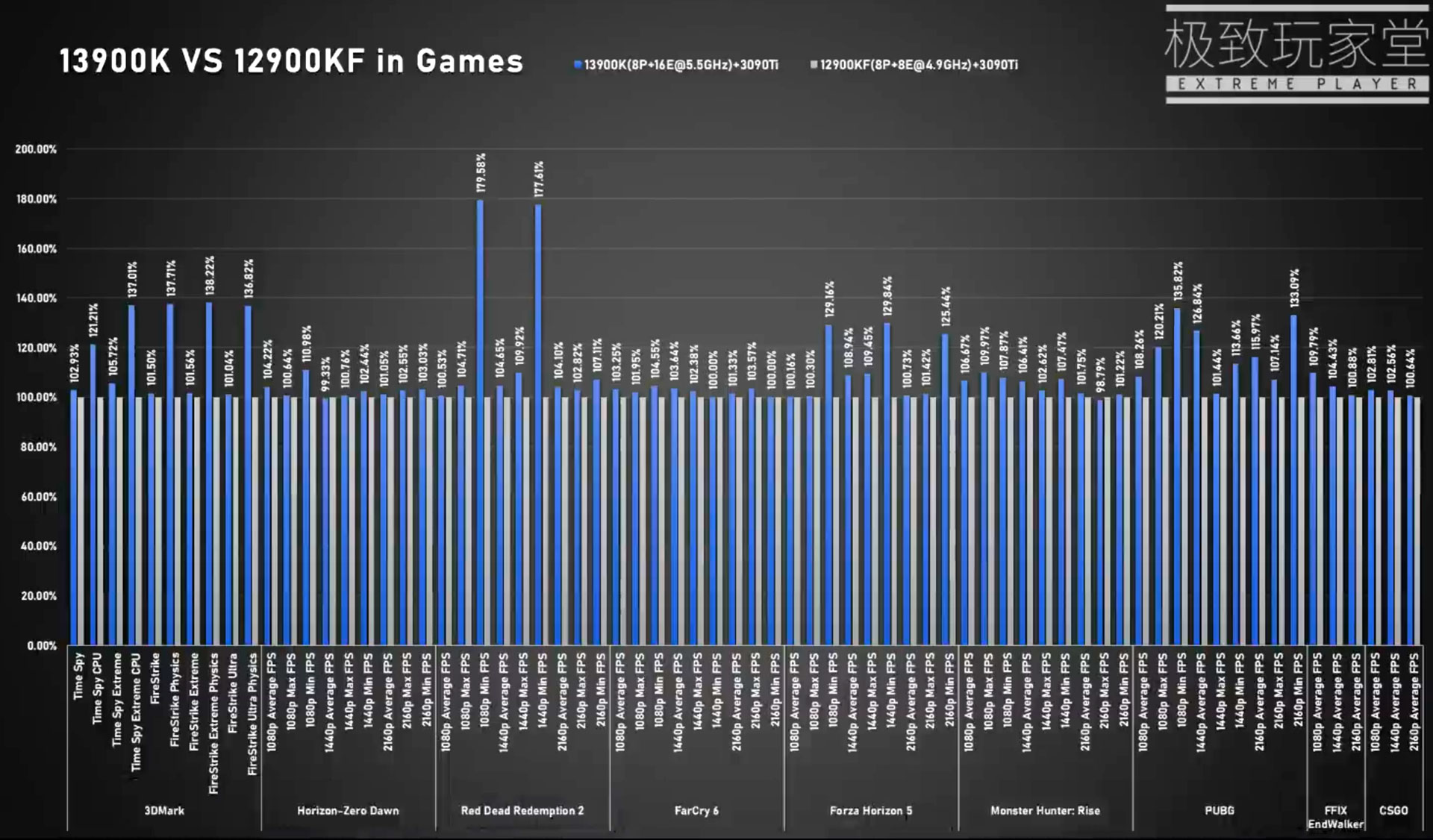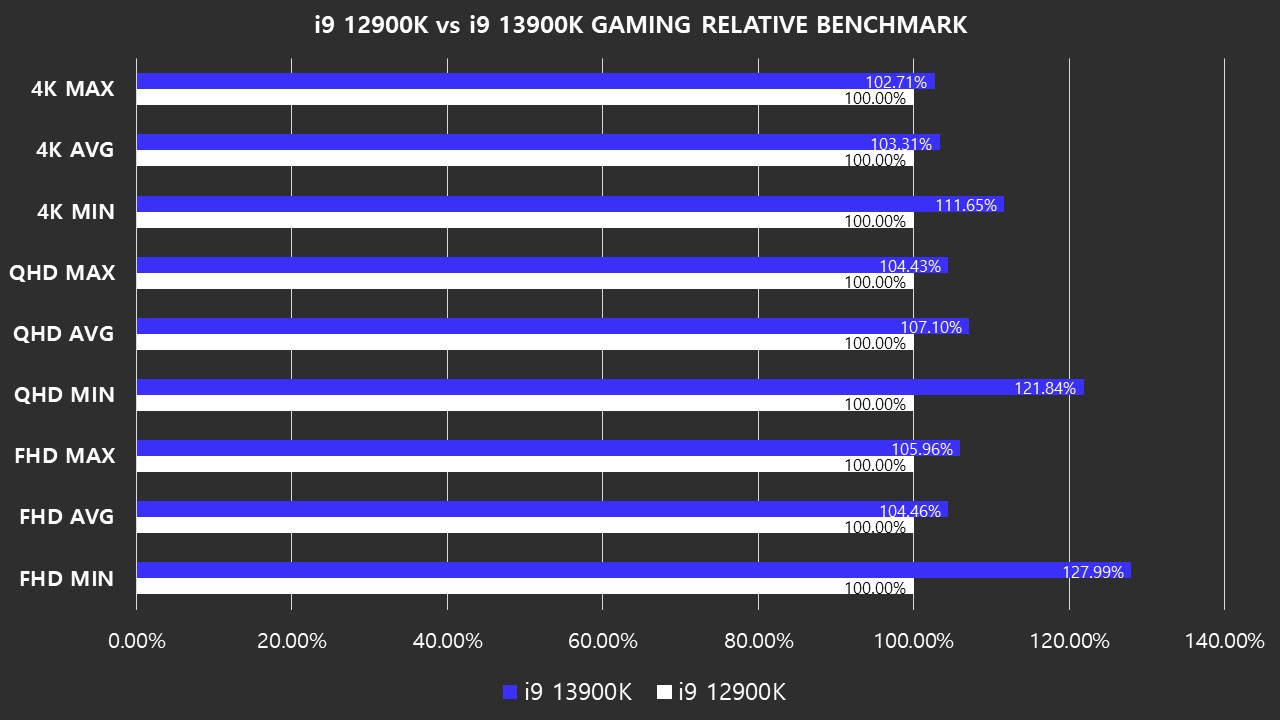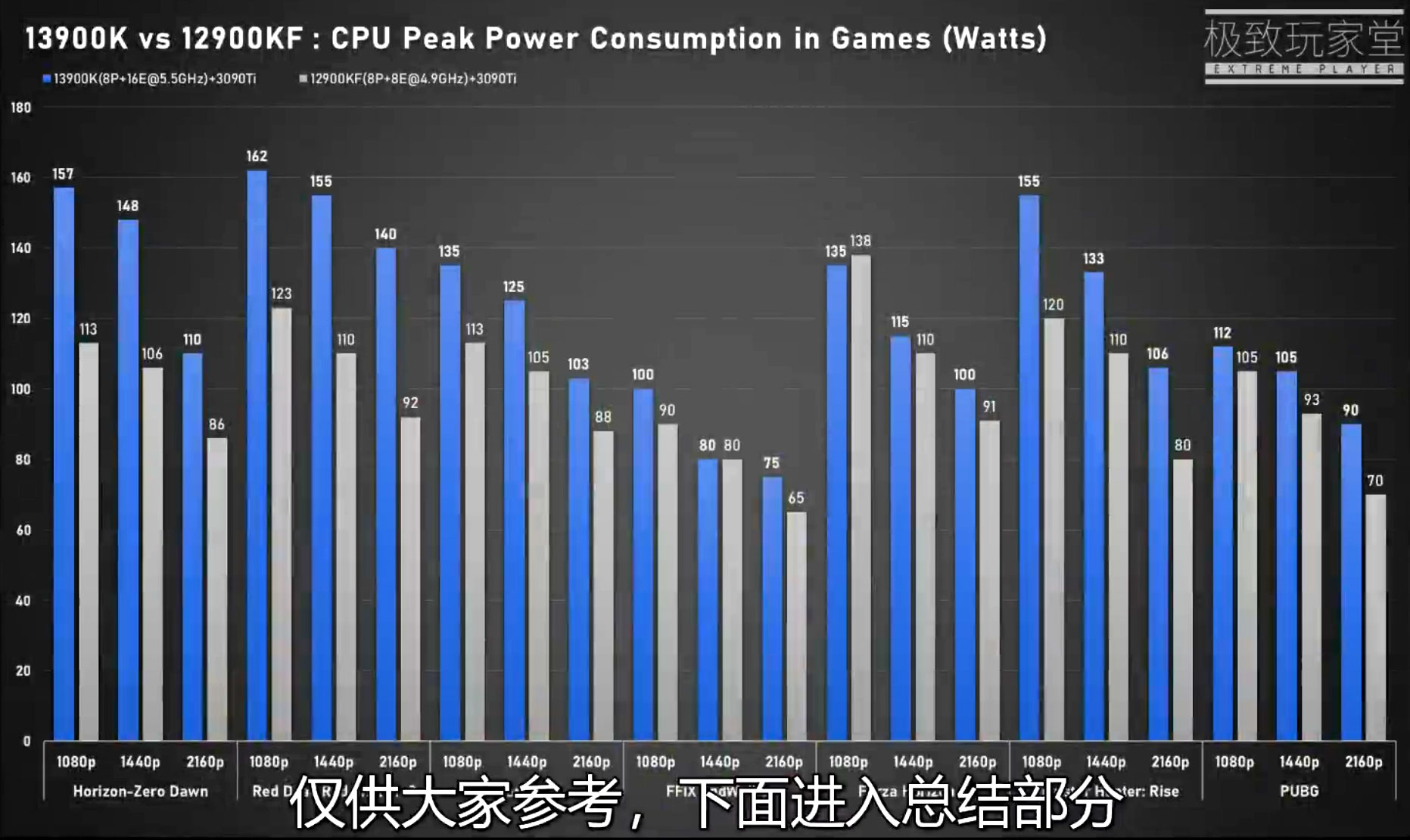Core i9-13900K Outperform Core i9-12900K By 5 Percent In Early Gaming Benchmarks
Bilibili techtuber Extreme Player returns with some gaming tests.
A purported Intel Core i9-13900K qualification sample (QS) processor has flexed its muscles in a handful of PC games in a video review. The flagship Raptor Lake chip poses to be one of the best CPUs. The game selection offered a basic overview but still managed to span the most popular genres and gaming styles today. With this tier of processors and a top graphics card, gamers will probably want to play at max quality settings. In such situations, the new Raptor Lake QS chip is only about 3 – 6% faster than its Alder Lake predecessor. Beware, though, that this is a qualification sample, and it seems to have relatively high peak power consumption.
The first genuine video review of an Intel Core i9-13900K QS processor surfaced A few days ago. It concentrated on synthetic and app benchmarks against an Intel Core i9-12900KF (the iGPU-less variant of the Core i9-12900K) on the same platform. It was an important moment in the lineage of leaks that have been uncovering the Raptor Lake flagship chip bit-by-bit for several weeks. The key takeaway was that the next-gen flagship offered an average 10% performance uplift in single-threaded workloads and 35% in multi-threaded workloads.
Today, the same Bilibili-resident TechTuber, Extreme Player, has followed up with a gaming-centric review. Twitter tech detective Harukaze5791 has taken the whole batch of results from the video to provide a clearer and condensed overview of the performance comparisons across the entire gamut of games (rather than tabulating games individually).



A significant change from Extreme Player’s synthetic/app testing was using a GeForce RTX 3090 Ti to let the processors work at their fullest potential. Other than that, the specs were the same as in the last video.
As well as providing the gaming performance benchmarks, Extreme Player charted some interesting peak power consumption stats. The Core i9-13900K chip sometimes ate considerably more power than its Alder Lake predecessor. The games with the most significant inter-generational peak power consumption differential didn’t tally with the games that gained the most fps from using the newer CPU. For example, Horizon Zero Dawn gaming showed very few performance benefits from the 13th Gen Intel Core processor advances. Still, peak power consumption across all three tested resolutions was at least 28% greater.
These are exciting results for PC gamers to mull over. Nonetheless, it is essential to remember a few things; this is a purported QS testing processor, and the results are questionable. The only 13th Gen Core processor enabling BIOS Asus (or MSI) provides right now is labeled as “for boot only and is not suitable for performance testing.”
Get Tom's Hardware's best news and in-depth reviews, straight to your inbox.

Mark Tyson is a news editor at Tom's Hardware. He enjoys covering the full breadth of PC tech; from business and semiconductor design to products approaching the edge of reason.
-
hotaru251 is it normal for a QS to only have that much improvment especially given the claims of it having much betetr performance than 12th gen?Reply -
TerryLaze Reply
It's gaming where the GPU is dictating what FPS are possible.hotaru251 said:is it normal for a QS to only have that much improvment especially given the claims of it having much betetr performance than 12th gen?
Also the real news is this here.
Whenever the game and the GPU allows the new CPU gets 21-27% better minimums at relevant resolutions and even 11% at 4k.
-
-Fran- The increase in power is quite a lot for the gains, but the min-FPS (lower 1 percentile?) looks good. Given how the increase in power seems to be quite high, I'd imagine it's because of a higher low-core count turbo and a higher ring BUS speed so it has lower latency. Also these are using DDR4, right? I'd imagine with DDR5 these differences would grow a bit more?Reply
I just really hope the power consumption doesn't go too much overboard... Ugh.
Regards. -
KyaraM Reply
Those 1% low gains are quite striking indeed. More frame rate stability is always a plus. Also, none of this is final. BIOSes supporting the 13900K QS so far only offer boot for the chips; they aren't optimized yet, as stated by the manufacturers. That means that both FPS might yet increase, and max power draw decrease with more optimisation and/or the new 700 series boards. Plus, it is also important how long the peaks last, how much you cam reign the chip in via undervolting, and if limiting power draw to, say, 130W has actual drawbacks, or id the performance loss is minimal as with Alder Lake chips where limiting the CPU to 125W has pretty much no drawbacks in games and very little elsewhere. Also, the minimum resolution here is 1080p, which doesn't really show real raw performance gains. That is best tested in 720p low settings. Plus, the GPU might still hold back the processor; it would be exciting to see this CPU perform with a 4090 or 7900XT.TerryLaze said:It's gaming where the GPU is dictating what FPS are possible.
Also the real news is this here.
Whenever the game and the GPU allows the new CPU gets 21-27% better minimums at relevant resolutions and even 11% at 4k.
-
TerryLaze Reply
Well, it also states @5.5Ghz which usually means an overclock of all cores to that clock, which would explain the much higher power draw in some games.-Fran- said:The increase in power is quite a lot for the gains, but the min-FPS (lower 1 percentile?) looks good. Given how the increase in power seems to be quite high, I'd imagine it's because of a higher low-core count turbo and a higher ring BUS speed so it has lower latency. Also these are using DDR4, right? I'd imagine with DDR5 these differences would grow a bit more?
I just really hope the power consumption doesn't go too much overboard... Ugh.
Regards.
It is supposed to get 5.5 on a couple of cores anyway so the minimums should be pretty close even at stock.
On the other hand if this is stock then for some reason those games might be loading the e-cores for no reason, since there is no increase in performance. -
KyaraM Reply
I would find it quite senseless to do the very first open testing on an OC'd system. It's probably just named so to show at what clock this sample ran, in case that things change with the final release CPUs. If e-cores are loaded accidentally, that would tell us two things. One, that the scheduler isn't final yet, which might be connected to the unoptimized BIOS; or two, that the e-cores don't hurt performance all that much, unless actual gaming performance would be tremendously higher otherwise, which I find unlikely. Personally, I feel it might simply be the BIOS at fault here...TerryLaze said:Well, it also states @5.5Ghz which usually means an overclock of all cores to that clock, which would explain the much higher power draw in some games.
It is supposed to get 5.5 on a couple of cores anyway so the minimums should be pretty close even at stock.
On the other hand if this is stock then for some reason those games might be loading the e-cores for no reason, since there is no increase in performance. -
jeremyj_83 This isn't unexpected since Raptor Lake was essentially just Alder Lake with more E cores attached to it. We probably won't see a larger performance increase from Intel until we get to Meteor Lake.Reply -
octavecode More power consumption and i imagine even worse thermals is not progress in my books.Reply